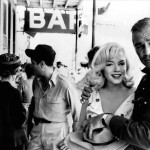No new Cine Club notes this week, as we decided spontaneously last night (and with mixed results) to watch John Huston’s The Misfits (1961). I love parts of the film — Thelma Ritter’s jokes and Montgomery Clift’s performance, in particular — and I think it’s a fascinating film to talk about. Clark Gable is so perfectly cast as the anachronistic cowboy lost in a world of conspicuous consumerism. Gable himself is as out of place as the character he portrays — Gable, the classic Hollywood star duking it out with a raucous bunch of method actors.
Also, it’s impossible for me to watch Marilyn Monroe in this picture and not imagine then-husband and screenwriter Arthur Miller by her side, feeding her lines and exploiting her beauty. The Misfits borders on pornographic in its treatment of Marilyn. Her body is oggled constantly by every man she encounters, by the camera in leering close-ups, and by the audience. In Miller’s short story treatment for the film, Marilyn’s character, Roslyn, personifies that same strange blend of sexpot beauty, schoolgirl innocence, and sympathetic fragility that Monroe exudes on screen, but on paper Roslyn can exist as metaphor, just as the horses that are so viciously and unnecessarily broken at the end of the story/film can exist as metaphors. When captured on film, however, the real seems to overpower the symbolic, and we’re forced to watch a real woman (with whose tragic end we are all familiar) be exploited and real horses be broken, which is a different thing entirely. (I’m sure that there is a film theorist, probably French, whose work would help me explain that better.)
And speaking of Arthur Miller and his exploitation of Marilyn Monroe, it turns out that my favorite TV actor, Peter Krause, is getting poor reviews for his turn as Quentin in the current Broadway revival of Miller’s After the Fall. Seems a horrible bit of miscasting to me. The role was originated by Jason Robards in 1964, under direction by Elia Kazan. Robards was, by turns, desperate and terrifying and imposing and, when necessary, sympathetic. Krause is so good at provoking our sympathy; I wonder if the reported lifelessness of his performance was a deliberate attempt to moderate that somewhat. For what it’s worth, I’d still really like to see the production.
